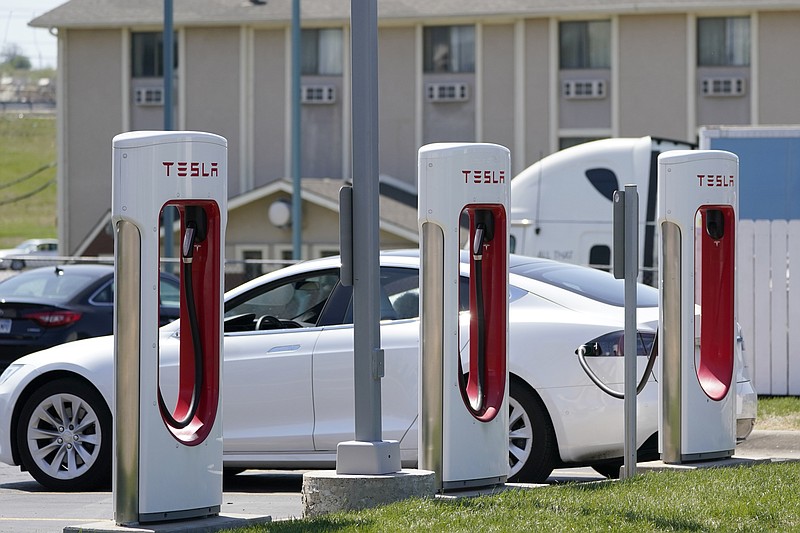Hello, Ford. Welcome to the new world - the new world of transportation post-combustion power. We're happy to welcome you, not just to the new world, but to the future world that will help us save our Earth and secure Tennessee's future economy and kids.
Ford Motor Co., which announced Tuesday it will build its first new assembly plant in more than a half century just northeast of Memphis to make electric-powered pickup trucks, isn't the first automaker to find the Volunteer State attractive or the first to build electric vehicles here. In fact, it's the fourth. But it is perhaps the most firm affirmation we've seen that the future is no longer decades away. It's the here and now.
And it's the biggest single business investment in our state's history.
Now what does that make us? It makes us strongly invested in climate change - that concept many our fellow citizens and red state lawmakers continue to whine about. Too many seem to want to blow off climate change and the need to prepare for it as - well, you know - a "hoax."
It's not a hoax. If it were, would Nissan, Volkswagen, GM and now Ford be putting billions of dollars into Tennessee to build electric car and truck assembly lines and electric battery manufacturing plants?
In the case of Ford, the company founded by the man who gave us our first gasoline-powered vehicle and weaned us off of horses and wagons, we're talking $11.4 billion to build three plants in Tennessee and Kentucky.
Ford and Korean battery maker SK Innovation announced Monday they will build a $5.6 billion "Blue Oval City" in Stanton, Tennessee, constructing both a battery plant and an assembly facility for the next generation of all-electric F-series trucks.
The auto and battery companies also plan a similar $5.8 billion joint venture to build twin battery plants in central Kentucky as part of what Ford officials said will be the largest new manufacturing investment in Ford's 118-year history. It is a move that is key to Ford's shift from gas-powered to battery-powered vehicles in the future.
"Just as Henry Ford made a bold investment a century ago to build the Ford Rouge plant (in Dearborn, Michigan), today we are making a similar bold move that will usher in a whole new century of mobility that is both sustainable and affordable," said Lisa Drake, chief operating officer for Ford in North America.
Most readers here recall that when Nissan began making its all-electric Leaf in Smyrna, Tennessee, in 2012 - then the largest EV production site in North America - many Tennesseans sneered.
Perhaps that sneer, and the Volunteer State's distaste for acknowledging human driven (pun intended) climate change is what stymied the growth of an industry that should already have made our state the king of electric vehicles.
Instead, even with Volkswagen being strong-armed into building electric cars here in Chattanooga following federal investigations of its emissions scandal, we're merely No. 3 in the country for electric vehicle production.
But Ford's announcement could change that. What's more, the state could emerge as a top state for the growing battery-powered transportation industry.
It means that we now have a whole lot of eggs - think nest eggs - in this basket of electric cars and trucks and climate change. GM is spending $2 billion to begin making the Cadillac Lyriq, a small electric SUV, at its Spring Hill factory, as well as $2.3 billion in a joint venture with LG Energy to produce batteries there. And, of course, here in Chattanooga, Volkswagen is investing $800 million to add a battery-powered small SUV to its lineup.
Ford is building he-man trucks, including the all electric Ford F-150 - the cowboy-swaggering, construction-worker favorite, best-selling vehicle in America for 39 straight years.
This new e-truck, the Ford 150 Lightning, won't just drive you to work and back over mountains and rivers. Its 563 horsepower and 775 pounds of torque (the most of any F-150 ever) will tow up to 10,000 pounds. And did we mention it has the ability to power your home when a storm knocks out your lights?
It will power something else, too: 5,700 jobs when it is up and running by 2025. What's more, the plant's construction will employ 33,000 people, including 15,600 direct jobs and another 17,200 indirect and "induced" jobs, generating $1.87 billion in payroll for Tennessee workers, according to state officials.
By the way, to the naysayers: The Facebook memes about neighborhood electric infrastructure not being ready for more than a handful of electric cars are incorrect. EPB's J Ed Marston said the Smart Grid makes us extremely prepared for EVs. Likewise, the cost to power EVs with electricity will not be more than gas. Compare for yourself at www.afdc.energy.gov. The annual fuel/electric cost of a 2020 gasoline-powered Ford Mustang driven about 34 miles a day is $1,184. For a 2021 Toyota Prius, it's $405. For a 2021 Tesla Model 3 Long Range AWD EV it's $326. What would that put back into your wallet?
No one in Tennessee or anywhere should be turning up their noses at electric vehicles, climate change policy and infrastructure.
In more ways than one, our futures are now inextricably tied to weaning ourselves away from fossil fuels.
